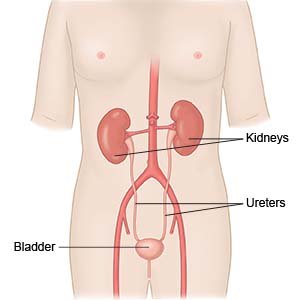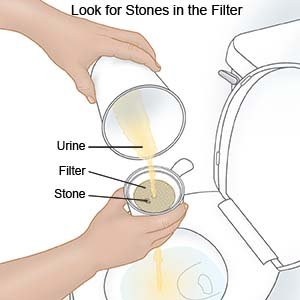Ureteral Stones
Medically reviewed by Drugs.com. Last updated on Jun 5, 2024.
AMBULATORY CARE:
A ureteral stone
forms in the kidney and moves down the ureter and gets stuck there. The ureter is the tube that takes urine from the kidney to the bladder. Stones can form in the urinary system when your urine has high levels of minerals and salts. Urinary stones can be made of uric acid, calcium, phosphate, or oxalate crystals.
 |
Common signs and symptoms:
- Severe pain on your lower abdomen or groin
- Nausea and vomiting
- Urge to urinate often, or not being able to urinate easily
- Burning feeling when you urinate, or pink or red urine
Seek care immediately if:
- You have severe pain that does not improve, even after you take medicine.
- You have vomiting that is not relieved by medicine.
Call your doctor if:
- You develop a fever.
- You have questions or concerns about your condition or care.
Treatment
may include any of the following:
- NSAIDs , such as ibuprofen, help decrease swelling, pain, and fever. This medicine is available with or without a doctor's order. NSAIDs can cause stomach bleeding or kidney problems in certain people. If you take blood thinner medicine, always ask your healthcare provider if NSAIDs are safe for you. Always read the medicine label and follow directions.
- Prescription pain medicine may be given. Ask your healthcare provider how to take this medicine safely. Some prescription pain medicines contain acetaminophen. Do not take other medicines that contain acetaminophen without talking to your healthcare provider. Too much acetaminophen may cause liver damage. Prescription pain medicine may cause constipation. Ask your healthcare provider how to prevent or treat constipation.
- Nausea medicine may help calm your stomach and prevent vomiting.
- A procedure or surgery to remove the ureteral stone may be needed if it does not pass on its own.
Treatment options
The following list of medications are related to or used in the treatment of this condition.
What you can do to manage uretal stones:
- Drink more liquids. Your healthcare provider may tell you to drink at least 8 to 12 (eight-ounce) cups of liquid each day. This helps flush out the stones when you urinate. Water is the best liquid to drink. Your urine will be clear (not yellow) if you are drinking enough liquid.
- Strain your urine every time you go to the bathroom. Urinate through a strainer or a piece of thin cloth to catch the stone. Take the stone to your healthcare provider so it can be sent to a lab for tests. This will help your healthcare providers plan the best treatment for you.

- Ask your healthcare provider about any nutrition changes you need to make. You may need to limit certain foods, such as foods high in sodium (salt) or protein. You may need to limit leafy green vegetables, carbonated drinks, or beer. These changes will depend on the kind of stones you have.

- Stay active. Your stones may pass more easily if you stay active. Exercise can also help you manage your weight. Ask about the best activities for you.

After you pass the ureteral stone:
Your healthcare provider may order a 24-hour urine test. Results from a 24-hour urine test will help your healthcare provider plan ways to prevent more stones from forming. Your healthcare provider will give you more instructions.
Follow up with your doctor as directed:
You may need to return for more tests. Write down your questions so you remember to ask them during your visits.
© Copyright Merative 2024 Information is for End User's use only and may not be sold, redistributed or otherwise used for commercial purposes.
The above information is an educational aid only. It is not intended as medical advice for individual conditions or treatments. Talk to your doctor, nurse or pharmacist before following any medical regimen to see if it is safe and effective for you.
Learn more about Ureteral Stones
Treatment options
Care guides
Symptoms and treatments
Medicine.com guides (external)
Further information
Always consult your healthcare provider to ensure the information displayed on this page applies to your personal circumstances.
